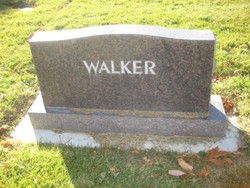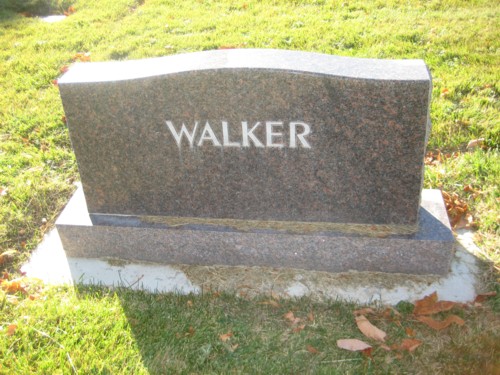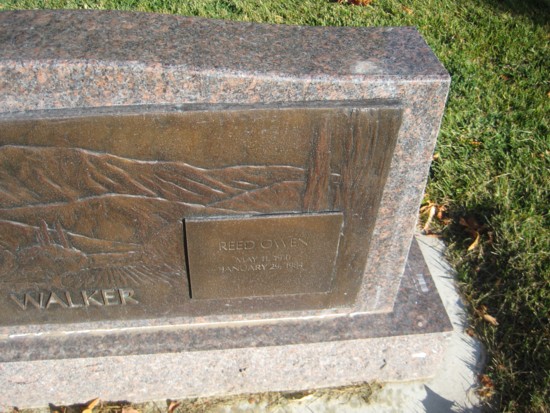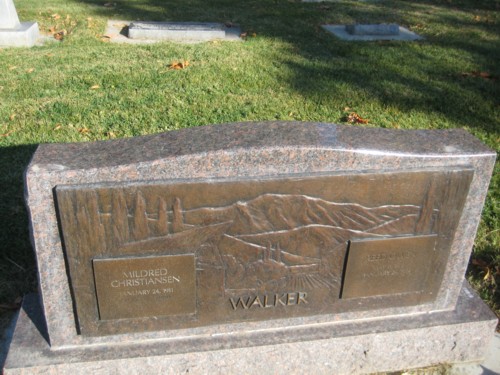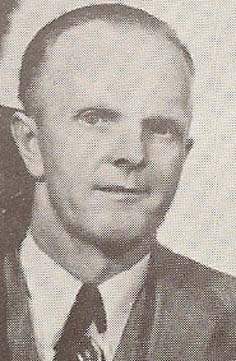Husband of Mildred Christiansen, married 4 Jan 1935 in the Salt Lake Temple in Salt Lake City, Salt Lake, Utah, USA
I was born on May 11, 1910 in Pleasant Grove, Utah, the tenth and last child of Sarah Christainsen and William Henson Walker. I had a very happy and carefree childhood, being a typical towhead. I went barefooted about all the time in the summer, and never combed my hair any more than necessary. It was a daily occurrance to have a shower bath or go swimming in the big ditch.
This carefree age didn't last neat long enough as we lived on a farm and I soon had to learn to work. I used to dread the job of thinning the beets. It seemed to take forever to crawl up and down those forty rod rows. About 11:30 a.m. I would want to go to dinner, but my dad would say, "Let's go one more round." My heart would sink, but there was nothing to do but continue to work. I got even with him later, thought. When he was older and I was a young man, he would get tired and want to quit work a little early and I would say, "Let's stay for a while longer." After we got our first car, father would send us kids to the field to work. We would weed for a round or two; then we wouold go for a ride around the block. I believe we spent more time riding than we did working.
I really enjoyed my school days. Most of my lessons came easy for me except geography, (I still don't know how to read a map). I had my share of fights at school. I always likes to play ball, run foot races, and wrestle. The socail part of school was really the best,as I enjoyed the assocation of so many friends. When the kids from Lindon came to Pleasant Grove to start high school, they all looked so homely to me, but after we got better acquainted they were just as good looking as the Pleasant Grove kids.
This was a period in my life when the Church didn't mean too much to me. I was young and healthy and felt as thought I was going to live forever and I didn't want religion to interfere with my education and my social life.
I had been active in the Aaronic Priesthood and scout work, but now I had more important things to do.
After graduating from high school I went to Salt Lake City to attend the LDS Business College. I enjoyed the school work, but soon learned that city life wasn't for me. In fact, I have never liked to go to the city since. In the spring of 1929, the call of the soil became too great, and financial problems also entered in; so I returned to Pleasant Grove to take up farming as my life's work. At that time I really began to appreciate the Church. It satisfied my socail as well as my spiritual needs. I learned that the people you assocaite with in Church are the best people on earth to be with. The first church position I had was secretary of the ward, YMMIA, and then later of the Stake MIA. In 1933, I was put in counselor in the superintendency of the Sunday School, which I enjoyed very much.
Mother had a number of sick spells, and because I was the only one of her children home, it fell to my lot to care for her and to do the housework. I would wash and iron, bake bread and do other household chores until I get so tired of it I have never wanted to do any house work since. Mother appreciated it so much and, I feel that it was her love that guided me through my problem years.
It was MArch of 1934, that I first became interested in my future wife. The stake genealogical ommittee was having a party and dance and a few of us boys were invited. I had known Mildred Christiansen for a number of years, but never assocaited with her. She was a beautiful girl, and I soon became attracted to her. (I took Mildred home that night and that was the beginning of a ownderful courtship.)
At that time she was also attending a stake missionary class which was held in our ward in connection with Sunday School; so I was kept in close contact with her. We were married on Jan. 4, 1935 in the Salt Lake Temple. She truly has been a wonderful and devoted wife. Four chldren have come to bless oour home. each one has been a joy and an inspiration to us.
In 1937, I was called to serve as president of the Elder's Quorum which position I held for three years. I also served in the presidency of the MIA and as superintendent of the Sunday School.
These were the depression years and it was a very meager income that we received from the farm. I tried to pick up a few extra jobs to supplement our needs. One fall I drove to Spanish Fork each day and put in eight hours of work for the Utah Power & Light Co.
In the summer of 1940, I was appointed ward clerk, but served only six months as I was called into the bishopric in November. The following Sunday, while out on ward business the news came over the radio that Japan had bombed Pearl Harber. It seemed that these war years were also the most difficult period in my life at home. So many things went wrong. Mildred had very poor health and her mother had a stroke in February. She was left alone after he two boys were called into the service, and of course we felt our responsibility for her.
In August of 1942, I went to work at Geneva to try to get some of that big money there were paying there. It was a full time job to work fo wages and farm,too.
I was called to be the bishop of our Ward in December of 1945. At first this was a big shock for me, as I had had enough experience in the Church to know that this was going to be a real responsibility. However, after a week or two of fighting with Satan, the Lord came to my rescue. I really received the spirit of my calling. In spite of all the problems that go with a bishop's job, there is no other church position that gives as much joy and satisfaction.
In 1947, we had to bring Mildred's mother to live with us as she was unable to take care of herself. She stayed with us till she passed away. These two experiences of caring for our mothers have been very education to us. Solomon said, "In all they getting, get understanding." We truly gained an understanding for those who have to care ofr their aged parents.
In 1950, after being released as bishop, I was called to serve on the stake high council. My special assignment was chairman of the stake Aaronic Priesthood.
I am still working at Geneva Steel and trying to farm a little on the side. Mildred and I have a very happy home life with out other two daughters. Our interests are mainly with our family and our church.
I have been rahter reluctant in iwriting this history, feeling that my life is of little interest to anyone else and hoping that my best years of service are ahead of me. I am proud to be a member of the Walker family and hope I will always be worthy of the name I bare.
Written in March 1958 by Reed Owen Walker
He passed away 24 Jan 1984 in Provo, Utah and buried in Pleasant Grove, Utah.
Husband of Mildred Christiansen, married 4 Jan 1935 in the Salt Lake Temple in Salt Lake City, Salt Lake, Utah, USA
I was born on May 11, 1910 in Pleasant Grove, Utah, the tenth and last child of Sarah Christainsen and William Henson Walker. I had a very happy and carefree childhood, being a typical towhead. I went barefooted about all the time in the summer, and never combed my hair any more than necessary. It was a daily occurrance to have a shower bath or go swimming in the big ditch.
This carefree age didn't last neat long enough as we lived on a farm and I soon had to learn to work. I used to dread the job of thinning the beets. It seemed to take forever to crawl up and down those forty rod rows. About 11:30 a.m. I would want to go to dinner, but my dad would say, "Let's go one more round." My heart would sink, but there was nothing to do but continue to work. I got even with him later, thought. When he was older and I was a young man, he would get tired and want to quit work a little early and I would say, "Let's stay for a while longer." After we got our first car, father would send us kids to the field to work. We would weed for a round or two; then we wouold go for a ride around the block. I believe we spent more time riding than we did working.
I really enjoyed my school days. Most of my lessons came easy for me except geography, (I still don't know how to read a map). I had my share of fights at school. I always likes to play ball, run foot races, and wrestle. The socail part of school was really the best,as I enjoyed the assocation of so many friends. When the kids from Lindon came to Pleasant Grove to start high school, they all looked so homely to me, but after we got better acquainted they were just as good looking as the Pleasant Grove kids.
This was a period in my life when the Church didn't mean too much to me. I was young and healthy and felt as thought I was going to live forever and I didn't want religion to interfere with my education and my social life.
I had been active in the Aaronic Priesthood and scout work, but now I had more important things to do.
After graduating from high school I went to Salt Lake City to attend the LDS Business College. I enjoyed the school work, but soon learned that city life wasn't for me. In fact, I have never liked to go to the city since. In the spring of 1929, the call of the soil became too great, and financial problems also entered in; so I returned to Pleasant Grove to take up farming as my life's work. At that time I really began to appreciate the Church. It satisfied my socail as well as my spiritual needs. I learned that the people you assocaite with in Church are the best people on earth to be with. The first church position I had was secretary of the ward, YMMIA, and then later of the Stake MIA. In 1933, I was put in counselor in the superintendency of the Sunday School, which I enjoyed very much.
Mother had a number of sick spells, and because I was the only one of her children home, it fell to my lot to care for her and to do the housework. I would wash and iron, bake bread and do other household chores until I get so tired of it I have never wanted to do any house work since. Mother appreciated it so much and, I feel that it was her love that guided me through my problem years.
It was MArch of 1934, that I first became interested in my future wife. The stake genealogical ommittee was having a party and dance and a few of us boys were invited. I had known Mildred Christiansen for a number of years, but never assocaited with her. She was a beautiful girl, and I soon became attracted to her. (I took Mildred home that night and that was the beginning of a ownderful courtship.)
At that time she was also attending a stake missionary class which was held in our ward in connection with Sunday School; so I was kept in close contact with her. We were married on Jan. 4, 1935 in the Salt Lake Temple. She truly has been a wonderful and devoted wife. Four chldren have come to bless oour home. each one has been a joy and an inspiration to us.
In 1937, I was called to serve as president of the Elder's Quorum which position I held for three years. I also served in the presidency of the MIA and as superintendent of the Sunday School.
These were the depression years and it was a very meager income that we received from the farm. I tried to pick up a few extra jobs to supplement our needs. One fall I drove to Spanish Fork each day and put in eight hours of work for the Utah Power & Light Co.
In the summer of 1940, I was appointed ward clerk, but served only six months as I was called into the bishopric in November. The following Sunday, while out on ward business the news came over the radio that Japan had bombed Pearl Harber. It seemed that these war years were also the most difficult period in my life at home. So many things went wrong. Mildred had very poor health and her mother had a stroke in February. She was left alone after he two boys were called into the service, and of course we felt our responsibility for her.
In August of 1942, I went to work at Geneva to try to get some of that big money there were paying there. It was a full time job to work fo wages and farm,too.
I was called to be the bishop of our Ward in December of 1945. At first this was a big shock for me, as I had had enough experience in the Church to know that this was going to be a real responsibility. However, after a week or two of fighting with Satan, the Lord came to my rescue. I really received the spirit of my calling. In spite of all the problems that go with a bishop's job, there is no other church position that gives as much joy and satisfaction.
In 1947, we had to bring Mildred's mother to live with us as she was unable to take care of herself. She stayed with us till she passed away. These two experiences of caring for our mothers have been very education to us. Solomon said, "In all they getting, get understanding." We truly gained an understanding for those who have to care ofr their aged parents.
In 1950, after being released as bishop, I was called to serve on the stake high council. My special assignment was chairman of the stake Aaronic Priesthood.
I am still working at Geneva Steel and trying to farm a little on the side. Mildred and I have a very happy home life with out other two daughters. Our interests are mainly with our family and our church.
I have been rahter reluctant in iwriting this history, feeling that my life is of little interest to anyone else and hoping that my best years of service are ahead of me. I am proud to be a member of the Walker family and hope I will always be worthy of the name I bare.
Written in March 1958 by Reed Owen Walker
He passed away 24 Jan 1984 in Provo, Utah and buried in Pleasant Grove, Utah.
Family Members
Sponsored by Ancestry
Advertisement
Explore more
Sponsored by Ancestry
Advertisement
